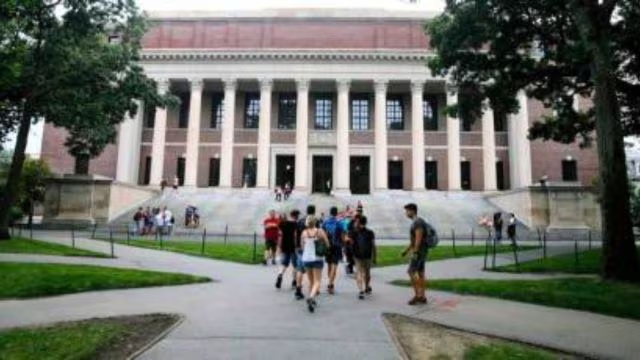Harvard University will not receive any new federal research grants until it meets a wide-ranging set of conditions set out by the Trump administration, the U.S. Department of Education said on Monday. The move is a dramatic escalation of the administration’s bitter feud with the Ivy League university and follows a prior freeze of $2.2 billion in federal grant money.
In a formal letter to Harvard University President Alan Garber, federal officials indicated that the elite university will need to “demonstrate responsible management” and fulfill several government-imposed requirements before it can be allowed back in on new federal research dollars. Significantly, the existing prohibition only extends to research dollars and does not touch financial aid directly given to students.
A high-ranking Education Department official, in an interview with the press on background during a press call, confirmed that Harvard University is now facing increased federal scrutiny. The official charged the institution with what the administration characterized as “serious failures” in four areas: the management of antisemitism, racial discrimination issues, a fall in academic rigor, and a failure to provide viewpoint diversity.
The federal order is the most recent in a series of policy actions by the Trump administration aimed at what it describes as ideological bias and mismanagement in elite universities. Harvard University has been repeatedly targeted as a symbol of the perceived liberal dominance in U.S. higher education.
The Education Department has stated that prior to any future research funding, Harvard University will have to enter into direct talks with federal officials and provide verifiable evidence of reforms. The reforms would have to deal with the four areas cited and entail a “substantive cultural shift” in the administrative and academic structure of the university.

Harvard University: What are the specific changes it will have to make to regain eligibility for federal research funds?
Harvard University has yet to make any public comment regarding the new ultimatum, but its president, Alan Garber, had previously taken a hard line against what the university considers political intrusion in academic matters. In a previous statement, Garber stated emphatically that Harvard will never sacrifice its institutional independence and academic integrity in light of partisan demands.
Earlier this month, Harvard University sued to prevent the continued freeze of its federal research funds, claiming the federal government acted arbitrarily, had no legal justification, and constituted a larger effort to suppress academic freedom. That case is pending in federal court.
Federal authorities did not specify for how long Harvard University would be excluded from receiving new research grants, but stressed that following the administration’s requirements will be monitored closely and considered prior to the review of funding decisions.
The Education Department’s action is being seen by many within the academic community as an unprecedented exercise of federal pressure to affect university governance and culture. Critics have been expressing worries over the implications for academic autonomy, particularly when research grants are made dependent on compliance with political or ideological requirements.
But defenders of the Trump administration policy contend that federal funding must be contingent on universities maintaining what they call “basic standards of fairness, accountability, and intellectual balance.” Harvard University, they contend, has failed to maintain an environment respectful of diverse perspectives and fair treatment of all students.
Specifically, the administration has consistently charged Harvard University with permitting antisemitic incidents to spread on campus without proper institutional response. Officials have also cited legal challenges to the university’s race-conscious admissions policies, which critics charge discriminate against Asian American applicants—a case that was previously litigated all the way to the U.S. Supreme Court.
The Trump Education Department has brought its current actions into line with its overall philosophy of reining in what it sees as ideological bias and unaccountable administration in elite universities. Harvard University, because of its prominence and historical influence, has become a focal point in this struggle.
While holding up research grants is not novel, the degree and character of the Trump administration’s demands have been characterized universally as a sea change in federal academic policy tactics. Specialists believe that if more institutions are given similar terms, it could actually change the balance between universities and the federal government.
For its part, Harvard University continues to assert its legal right to receive federal funds under previously awarded grants and to be judged on academic merit and adherence to existing regulations—not new political standards.
The case has drawn national attention and generated controversy regarding the boundaries of federal power in higher education. Some legal experts point out that the government does have wide latitude in the awarding of research grants, but warn that exercising this latitude to impose ideological or cultural requirements could raise constitutional issues.
As the standoff continues, thousands of researchers and Harvard faculty members wait anxiously for direction on the future of federally funded academic endeavors. A number of scientific projects funded by federal grants—climate science to biomedical discovery—may be delayed or shut down if the freeze persists.
No time frame for talks or specific step-by-step formula for restoring access to grants was provided by the Trump administration. Meanwhile, Harvard University will press on with litigation, insisting academic freedom and innovative research should never be subject to political interests.
With the 2024 presidential election now behind him, former President Trump and his supporters continue to exert control over schools, making Harvard University a symbol of what they see as the needed transformation of American academia.
Whether Harvard University will eventually obey the administration’s conditions or succeed in court is anyone’s guess—but the verdict may establish a long-term precedent for the independence of U.S. universities against federal interference.
ALSO READ
Trump Administration Threatens 27% of Harvard Students
Barack Obama Backs Harvard’s Bold Rejection of Trump’s 3 Demands